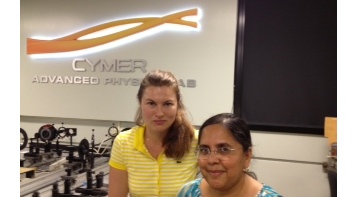
The Physics Department is very happy to welcome Dr. Lyube Kuznetsova as our newest faculty member. Lyuba was chosen from a pool of extremely competitive list of over 90 applicants. Lyuba comes with an impeccable pedigree: her PhD is from Cornell University and she has competed post-doctoral training at Harvard and Brown Universities. Lyuba is in experimental optics and very successfully explored (evidenced by her strong publications and stellar recommendations) topics ranging from quantum electrodynamics in microcavities, mode locking of quantum cascade lasers to high performance fiber amplifiers for ultra-short pulses. She will be a great addition to our existing vibrant optics program. We extend our full support to her and wish her the best in her new position.
In my own words
“From childhood experiments with paper cups and strings to recent measurements using an Atomic Force Microscope, physics was always something that captivated my mind. I was born in a suburb of Moscow, Russia. My interests, ranging from poetry to science, almost never fit into a school program. Growing up, I wanted to be a ballerina, a journalist, and a lawyer in sequential order. It was a turning point when my parents gave me a science book for my birthday. Physics turned out to be a lot of fun (especially when you have a few other kids following you in doing “experiments”)! This childhood interest in “how things work” eventually led me to the Physics Department at the Lomonosov Moscow State University.
It was during my junior year when I did my first laser experiment. My first research was on the picosecond four-photon spectroscopy of ultra-thin Ni films. Nonlinear optics was always a fascinating subject for me. Thinking about the pulses of several cycles was mind-boggling. I wanted to study the physics of ultrashort pulses. I entered the PhD program at Cornell and started working with femtosecoind pulses. Those five years of graduate school were a lot of joy, pain and everything in between. At Cornell, I finally found a “missing link” between physics and engineering. I discovered that a new fundamental concept can lead very quickly to an interesting application. In my last year of graduate school, I developed an interest in nanoscale devices. I continued to study ultrafast phenomena but on nanoscale as a Research Associate at Harvard and Brown Universities.
This Fall, I am very excited to start my own independent research in nanophotonics and cavity quantum electrodynamics at the Physics Department at San Diego State University. I am currently investigating quantum electrodynamics effects in GaN-based lasers and silicon microcavities. Research in my lab focuses on the different ways of controlling light on the subwavelength scale via the modification of the photonic environment. Projects include ultrafast nanocavity LEDs for visible light communications, emerging metamaterials for light control, and microcavity-based optical sensors for bio-medical applications. I am very happy to be here and hope to contribute to the great research and excellent teaching traditions of the Physics Department!”

